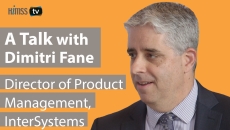Analytics
CEO Silvia Pfeiffer discusses how Coviu's PhysioROM telehealth platform allows physiotherapists to monitor their patients' range of motion in a standardized manner for improved reporting and analytics.
NLP application embedded during coding phase allows for better compliance and more precise reimbursement.
One-third discuss charge capture weekly, while 18 percent discuss it twice a month, 8 percent discuss it daily, and 2 percent don't discuss it at all.
The NHS must ensure that all stakeholders are prepared and willing to embrace innovation, says James Freed, CIO, Health Education England.
With the increasing volume and complexity of data in clinical situations, artificial intelligence can help support and guide care providers' decision-making processes, says Dimitri Fane, director of product management of TrakCare at InterSystems.
Yun Hong, Global Business Manager, Samsung SDS, says his company's wearable S-Patch ECG monitor collects and automatically uploads data to the cloud, which makes it is easier to use than conventional technology deployed for the same purpose.
Increasingly large, complex data sets, and a growing need to reduce increasing costs, are driving market growth.
Emily Vaughn, product development director of Change Healthcare, and Tim Dunlevy, VP of engineering at PokitDok, discuss what they believe will be the first use cases for blockchain as well as the process of going from private to public blockchain networks.
The key to making the most of blockchain technology is to address the fragmentation of data, says Abel Kho, director of the Center for Health Information Partnerships at Northwestern University and co-founder of Health Data Link.
Stakeholder participation, real-time transparency and emerging use cases will likely help blockchain permeate healthcare over the next several years.





